In the creative cosmos of beloved Dutch poet Annie M.G. Schmidt, anything is possible — and the more whimsical, the better. Her rollicking poems transform ordinary events and places into extraordinary adventures full of imagination.
– Eerdlings: the official blog of Eerdman’s Books for Young Readers
The Man Who Writes Fairy Tales has run out of ink. Luckily for him, there is a pond full of the rich black stuff at the foot of his garden where he can go to fill up his pen whenever inspiration strikes: “He’s made up ten thousand stories already / and has plenty more — he’s constant and steady. / And if he keep writing till the day that he dies, / perhaps he’ll have written that pond of his dry:”
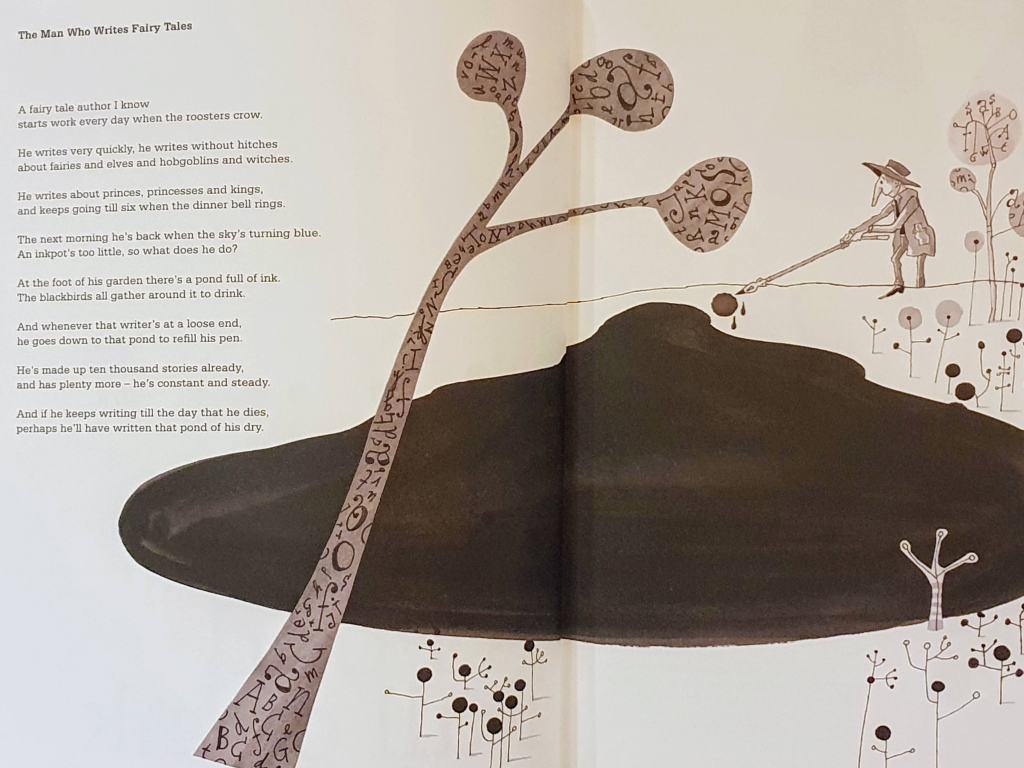
As if written with that magical ink, brightly illustrated poems starring Schmidt’s favorite types of naughty children and frustrated parents burst into view. Soon there are kings and queens, fairies and elves, giants and witches, dragons and spiders, in a parade of joyfully silly situations and predicaments with a manic, slightly psychedelic 70s vibe. Although as inventive, nonsensical, and hilarious as verses by Roald Dahl, Shel Silverstein, or Jack Prelutsky, Schmidt’s poetry, hugely popular in the Netherlands, had never been translated into English during her lifetime. In fact, the translation of A Pond Full of Ink was published almost 20 years after Schmidt’s death, “the first time that a collection of verses with the Dutch illustrations…was published abroad.”
Schmidt’s translator David Colmer works his poetic magic here, first with a British English edition and then a couple of years later tweaking or “rejigging” them for a new American edition, brilliantly unpacking the original Dutch rhymes and rhythms, recreating them so that the poems have an English life of their own. The wit and mischievous antics of Schmidt’s wildly imaginative characters take center stage as they snap at everyone around them, feed their crocodiles, listen with their whim-wham ears for little children misbehaving, dress up their camels, move into tree houses, or simply refuse to get clean like Belinda Beronda:
Belinda Hated Getting Clean... Belinda Beronda, from somewhere near Flushing, was not keen on washing and not fond of brushing. She was an inveterate cleanliness hater, and always postponed her baths until later. Her bodily odor grew stronger and stronger, and her hair and her nails grew longer and longer. Belinda was filthy, a terrible fright. She looked like a pig, a horrible sight. And when her mother finally came home with soap and shampoo and a brush and a comb, Belinda just started to yell, howl, and glower, as if she was going to drown in the shower. Her mother - by now at the end of her tether- gave in and shouted "Stay dirty forever! But if that's what you want, you just walk out that door, and I won't be your mother anymore!" So that filthy little Belinda Beronda took off up the street and started to wander the highways and byways all over the land, getting grubby and covered with mud, dirt, and sand, with grimy smudges all over her face. The more she avoided a bathroom or scrubbery, the more she began to resemble some shrubbery. Grass started growing on her shoes and her clothes, it covered one leg, then slowly rose, until she was totally, thoroughly hid and no one could see that she was a kid! And then the roots grew into the ground, and fixed her in place like a tree on a mound. Birds came and build little nests on her sleeves, and slowly she grew her own branches and leaves. A nightmare, but true- you can take it from me -- Belinda Beronda turned into a tree. So now you know, little cleanliness haters end up as trees....sooner or later. (p. 49-50, US edition)
Every child and every parent can immediately relate to Belinda’s outrage and her mother’s exasperation. This is the beauty of Schmidt’s sly creativity, the irrational, obstinate child and the parent who has reached their limit are equally involved and responsible for the chaos that ensues. The combination of text and illustrations here by artist Siep Posthuma are inventive above and beyond the details in the poem, his Belinda Beronda is crowned with medusa-inspired tentacled hair over which spiders create their webs and flies buzz, and the pages are peppered with black watercolor droplets, capturing the essence of the “grimy smudges all over her face”:

Schmidt’s habit of rooting her poems in reality and then adding a striking twist of dissonance was a perfect match for Posthuma’s tongue-in-cheek humour.
– Childrens Books from Holland Spring 2015, Nederlands Letterenfonds // Dutch Foundation for Literature
Posthuma won the 2012 Gouden Penseel illustration prize for the best Dutch children’s book for his illustrations, and no doubt provided further encouragement for bringing the book to a larger, international audience. Kirkus Reviews in their starred review, “Between the ravishingly well-crafted verse, with its tight meter and lithe rhyme, and Posthuma’s stark, richly layered mixed-media illustrations, readers can spend hours savoring each page.”
I certainly have spent some wonderful moments with Aunt Sue and Uncle Steve’s treehouse, branches where children chase each other, platforms and ladders lead to laundry, Uncle Steve in an armchair, a hanging baby buggy: “They sleep up there and eat up there / It’s very cosy, in the air”:
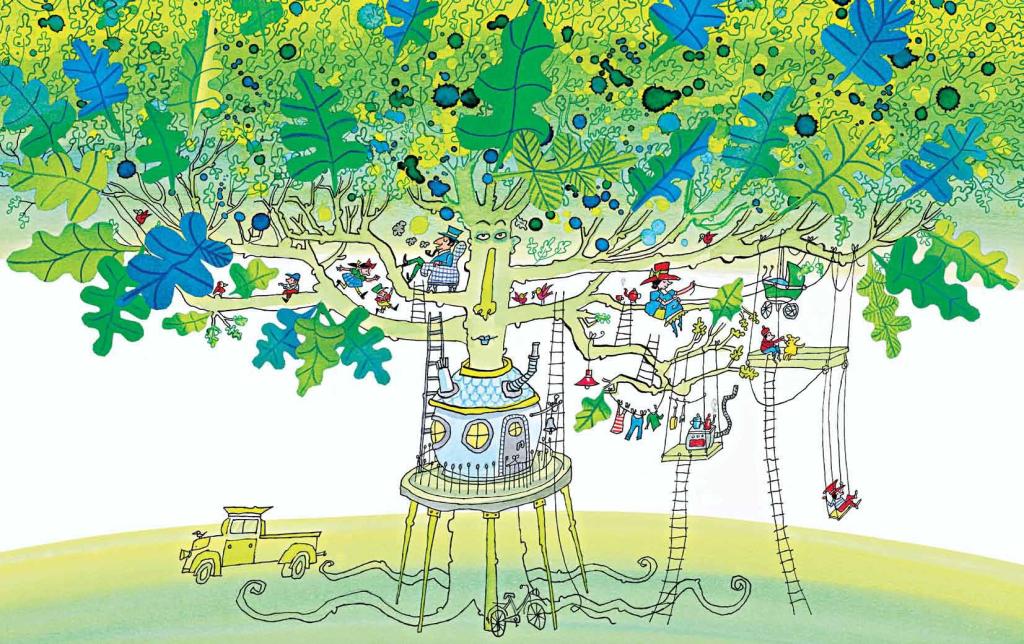
And I had to stop and wonder, is Schmidt just talking about “The Furniture” in this poem, or is there a bigger observation underneath about those who “roam” and those who “stay home”:

“Would you like to come out walking?” said the table to the chair, “I’ve been standing here forever, and I’d like to take the air.” “Now you mention it, I’d love to come,” the chair at once replied. “Why, we both have legs beneath us that we’ve never even tried.” “May I keep you company?” the oaken sideboard then inquired. “Though I am a little heavy and I fear I may get tired. With these cups and plates and glasses in my chest, I sometimes wheeze. Would you care to join us, bookcase?” And the bookcase said, “Yes, please.” So the furniture went strolling for an hour on the shore. But the clock and lamp weren’t able and remained there as before. In the empty house they grumble that the others shouldn’t roam. But they know that life is like that: those who don’t have legs stay home.
Truly, “the more whimsical, the better” applies to A Pond Full of Ink. There is a wonderful booktrailer to share with children too, perfect for poetry units and celebrations for all ages. Here The Man Who Writes Fairy Tales returns at the end of the book, lying contentedly in a hammock strung between two trees under a black, starry sky. The pond is emptied of ink and his pen lies on the ground beneath his bed, the last fairy tale poem written, read, and, most certainly, remembered.
A Pond Full of Ink: Annie M.G. Schmidt’s Most Beautiful Children’s Poems
Written by Annie M.G. Schmidt
Illustrated by Sieb Posthuma
Translated from the original Dutch by David Colmer
Published as by Em. Querido’s Uitgeverij BV, 2011
ISBN: 978-0-8028-5433-9
Picture book/poetry ages 6-14
Also available in a US Edition published by Eerdmans Books for Young Readers, 2014
ISBN: 9780802854339
You can buy a copy of A Pond Full of Ink here.
Reviews for A Pond Full of Ink:
School Library Journal’s Elizabeth Bird writes, “Readers who flip through the pages will encounter everything from thieves that covet the moon to a teakettle with musical aspirations. The end result is a collection that is silly, subversive, and sly by turns.”
Kirkus starred Review, “Heartwarming creative genius abounds here, offering visual and aural pleasures aplenty: not to be missed.”
Selected Awards for A Pond Full of Ink:
Sieb Posthuma won the 2012 Gouden Penseel for his illustrations for A Pond Full of Ink/Een vijver vol inkt.
“The Gouden Penseel is a sister prize to the Gouden Griffel, the prize for the best Dutch children’s book.”
The Globe and Mail The Globe 100: The Best Books of the Year List (2014)
“Fun with just a dash of sinister.”
Kirkus Review‘s “Best Picture Books of 2014 That Confound Expectations” List
New York Public Library’s “100 Children’s Books for Reading and Sharing” list
This post may contain affiliate links that earn Global Literature in Libraries Initiative a commission at no extra cost to you.
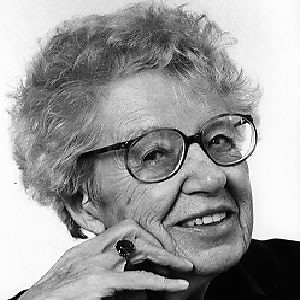


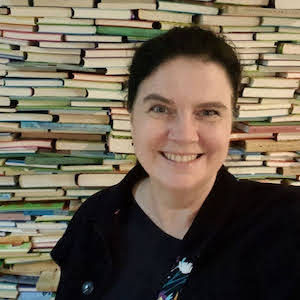
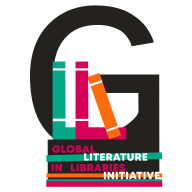
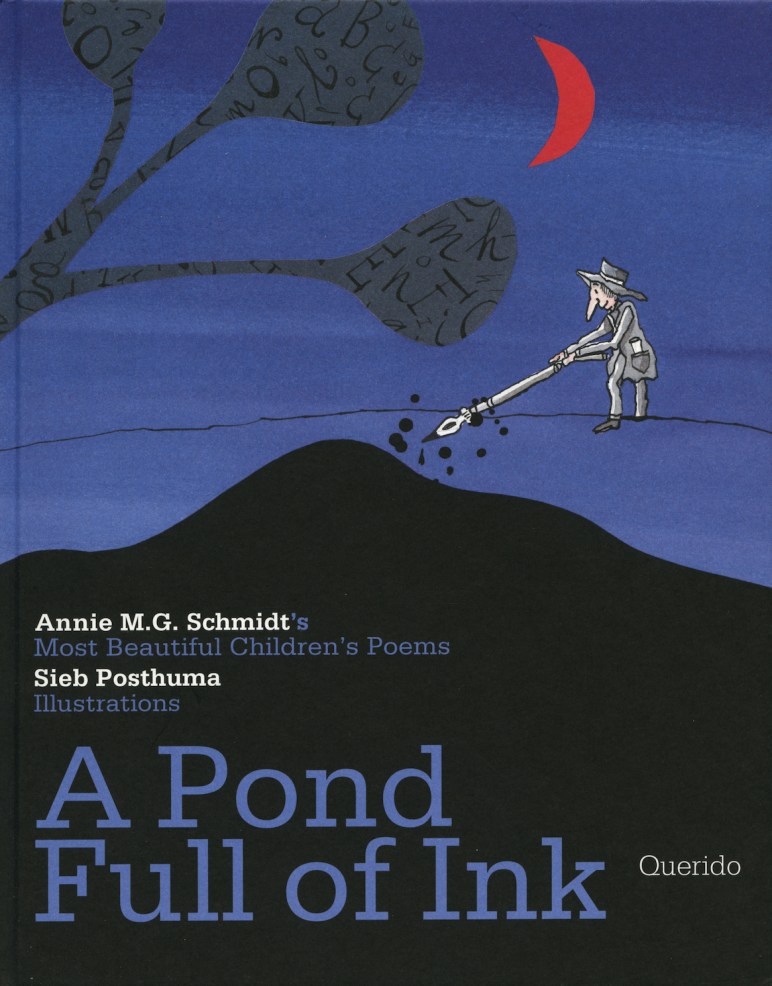
Terrific post! Our YouTube channel, TRANSLATORS ALOUD, recently featured the translator himself reading one of Annie M.G. Schmidt’s poems! Have a watch here; it’s absolutely wonderful.
LikeLike